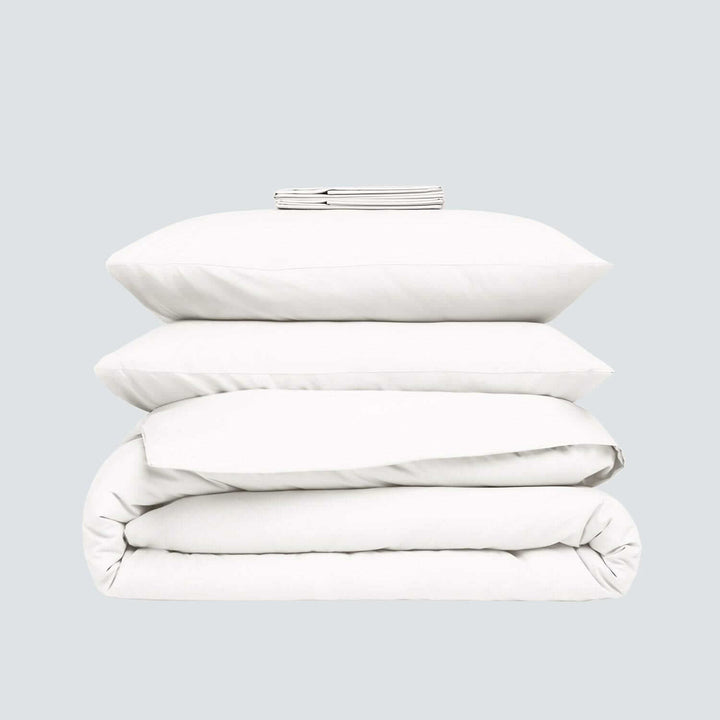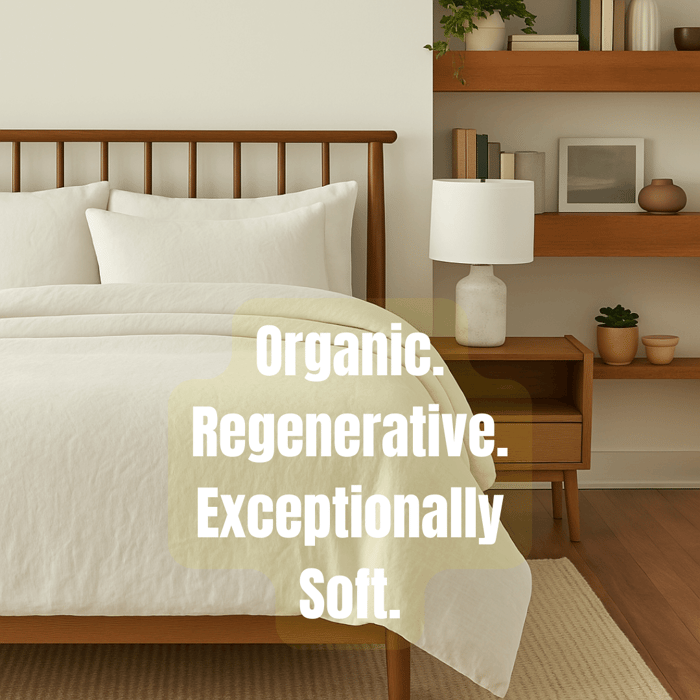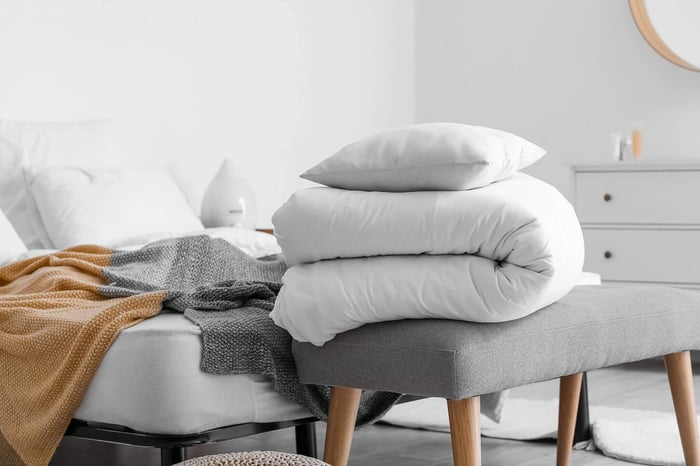Table of Contents
- 📝 Key Takeaways for Organic Comforters
- Understanding Organic Comforters
- Benefits of Choosing Organic Comforters
- Key Materials Used in Organic Comforters
- How to Identify Quality Organic Comforters
- The Importance of Certifications and Standards
- Comparing Different Types of Organic Comforters
- Tips for Maintaining Your GOTS-certified Comforter
- Eco-Friendly Brands to Consider
- The Impact of Comforters on Sleep Quality
- Conclusion: Making an Informed Choice for Your Healthy Home
- FAQs on Wool Duvet Inserts, Comforters & Sustainable Bedding
You spend nearly a third of your life wrapped in a comforter—so it should be more than just soft. The best organic comforters breathe with you, regulate your temperature, and restore calm at the end of every day.
This isn’t about chasing the latest “green” trend. It’s about choosing what feels right—natural fibers, responsible craftsmanship, and materials that let your body rest the way nature intended.
In this guide, we’ll unpack what makes an organic comforter truly worth it: from understanding fill materials and certifications to finding that sweet spot between weight, warmth, and wellness. Because when your bedding works in harmony with your body and your values, sleep becomes more than routine—it becomes renewal.
📝 Key Takeaways for Organic Comforters
Organic wool comforters use temperature-regulating ZQ-certified wool to eliminate night sweats and enhance deep sleep cycles by up to 25%.
The best non-toxic duvets are GOTS-certified, meaning they are processed without harsh chemicals, dyes, or synthetic flame retardants.
Your choice of fill (wool, cotton, or silk) should balance warmth with breathability to create a truly hypoallergenic and chemical-free sleep environment.
Understanding Organic Comforters
When it comes to creating a healthy sleep environment, the comforter you choose plays a significant role. Organic comforters stand out as a premium choice for those seeking to combine comfort with eco-conscious living. But what exactly is an organic comforter?
Essentially, an organic comforter is made from materials grown without harmful chemicals or pesticides and processed without toxic dyes or finishes. This ensures that the comforter is not only gentle on your skin but also on the planet.
Organic comforters come from a variety of natural sources, including cotton, wool, bamboo, and silk. These materials are carefully sourced and manufactured to maintain their organic integrity.
Unlike conventional comforters, which may contain synthetic fibers and chemical treatments, organic comforters offer a purer, more natural alternative. They are often hypoallergenic and provide a healthier option for those with allergies or sensitivities.
The journey of an organic comforter from farm to bed involves stringent regulations and standards. Every step, from harvesting the raw materials to the final stitching, is monitored to ensure it meets organic criteria.
This meticulous process guarantees that when you snuggle under an organic comforter, you’re wrapped in a product free from harmful substances, providing a natural and safe sleep environment.
Benefits of Choosing Organic Comforters
Opting for an organic comforter comes with a plethora of benefits that extend beyond just a good night’s sleep. Firstly, organic comforters are hypoallergenic, making them an excellent choice for individuals with allergies or skin sensitivities. The absence of harsh chemicals and synthetic materials means fewer irritants that can trigger allergic reactions. This ensures a cleaner, healthier sleeping environment conducive to uninterrupted rest.
Another significant benefit is the environmental impact. Organic farming practices are designed to be sustainable and environmentally friendly. By choosing organic comforters, you support agricultural methods that reduce pollution, conserve water, and promote soil health. This not only helps in preserving our planet but also ensures that the materials used are renewable and biodegradable, reducing the carbon footprint associated with bedding production.
Moreover, organic comforters often come with enhanced breathability and moisture-wicking properties, particularly those made from materials like organic cotton and wool. These natural fibers regulate temperature effectively, keeping you warm during colder months and cool during warmer seasons. This adaptability contributes to a more comfortable sleep, preventing overheating and night sweats, which can disrupt your sleep cycle.
Organic Wool Comforter

$342.00
$380.00
Our organic wool comforter is designed to keep you dry, balanced, and deeply comfortable all night. Unlike down or synthetic comforters that trap heat, our spun wool design wicks away moisture and prevents overheating, so you stay cool & dry.… Read more
Key Materials Used in Organic Comforters
Understanding the materials used in organic comforters can help you make an informed choice. Organic cotton is one of the most popular materials, known for its softness, durability, and breathability. It provides a plush, comfortable feel while being incredibly gentle on the skin. Organic cotton is grown without the use of synthetic fertilizers or pesticides, ensuring that the end product is free from harmful residues.
Wool is another excellent material for organic comforters. Sourced from organically raised sheep, organic wool is naturally hypoallergenic and resistant to dust mites. It also has excellent temperature-regulating properties, making it suitable for year-round use. Wool’s natural moisture-wicking ability ensures that it absorbs and releases moisture effectively, maintaining a comfortable sleeping environment.
Bamboo and silk are also used in organic comforters, each bringing their unique benefits. Organic bamboo is known for its incredible softness and eco-friendliness. It’s a fast-growing plant that requires minimal water and no pesticides, making it a sustainable choice. Silk, on the other hand, adds a touch of luxury to your bedding. Organic silk is produced without harsh chemicals, resulting in a smooth, hypoallergenic fabric that’s gentle on the skin and naturally regulates temperature.
How to Identify Quality Organic Comforters
Choosing a high-quality organic comforter involves more than just looking for the "organic" label. There are several factors to consider to ensure you’re getting the best product for your needs. One of the primary indicators of quality is the source of the materials. Reputable brands will provide transparency about where their materials are sourced and how they are processed. Look for detailed information about the farming and manufacturing practices used.
Another critical aspect is the thread count and fill power. The thread count refers to the number of threads per square inch of fabric, and a higher thread count generally indicates a softer and more durable comforter. Fill power measures the loft or fluffiness of the comforter, with higher fill power indicating better insulation and warmth without added weight. These factors combined can give you a good idea of the comforter’s overall quality and performance.
Customer reviews and ratings can also be invaluable when assessing the quality of an organic comforter. Real-life experiences from other buyers can provide insights into the comforter’s longevity, comfort, and overall satisfaction. Additionally, check for any guarantees or warranties offered by the manufacturer. A company that stands behind its product and offers a solid warranty often reflects confidence in the quality and durability of their comforters.
The Importance of Certifications and Standards
Certifications play a crucial role in distinguishing truly organic comforters from those that merely claim to be. Several reputable organizations provide certifications that ensure the organic status of the comforters you purchase. The Global Organic Textile Standard (GOTS) is one of the most recognized certifications. GOTS certifies the entire supply chain, from harvesting raw materials to environmentally and socially responsible manufacturing. A GOTS-certified comforter ensures that it meets stringent ecological and social criteria.
Another important certification is OEKO-TEX Standard 100, which tests for harmful substances. Although it is not exclusively for organic products, it guarantees that the comforter has been tested for and is free from harmful chemicals. This certification is an additional assurance that the product is safe for your health.
Certified Organic Wool (COW) and Fair Trade Certified are other labels to look out for. Certified Organic Wool ensures that the wool used is sourced from sheep raised without synthetic hormones or pesticides. Fair Trade Certified indicates that the product was made under fair labor conditions and that workers were paid fair wages. These certifications collectively ensure that your comforter is not only organic but also ethically produced, supporting fair labor practices and sustainable agriculture.
The most significant distinction for Antipodean Home is our commitment to regenerative materials. Our signature wool comes with ZQRX certification, which goes far beyond standard organic practice. ZQRX ensures our wool is sourced from farms actively working to improve the ecosystem—rebuilding soil health, capturing carbon, and supporting biodiversity. Choosing our bedding means you're investing in products that not only reduce harm but are actively restorative to the environment.
Organic Wool Bedding Set

$598.40
$748.00
Cooler Nights & Deeper Sleep — Every Night Elevate your sleep with our organic wool bedding set, crafted from regenerative New Zealand wool and organic cotton for balanced, all-season comfort. These breathable, eco-friendly fibers naturally wick away heat and moisture… Read more
Comparing Different Types of Organic Comforters
Organic comforters come in various types, each suited to different needs and preferences. Organic cotton comforters, for instance, are prized for their breathability and softness. They are ideal for people who prefer a lightweight, airy feel and are looking for a versatile option that works well in different climates. Cotton comforters are also easy to care for and can be washed frequently without losing their integrity.
On the other hand, organic wool comforters are perfect for those seeking superior insulation and moisture control. Wool's natural properties make it an excellent choice for regulating body temperature, keeping you warm in winter and cool in summer. Wool comforters are also naturally resistant to dust mites and mold, making them a great option for allergy sufferers.
For a touch of luxury, organic silk comforters provide a smooth, hypoallergenic surface that feels indulgent against the skin. Silk’s natural protein structure means it is less likely to cause skin irritations, making it an excellent option for those with sensitive skin. Silk also has natural temperature-regulating properties, making it an all-season comforter. Bamboo comforters combine the best of both worlds, offering the softness of silk and the breathability of cotton, with the added benefit of being highly sustainable and eco-friendly.
For more, see our Wool vs Down vs Synthetic vs Bamboo: The Comforter Comparison.
Tips for Maintaining Your GOTS-certified Comforter
Proper care and maintenance of your comforter can significantly extend its lifespan and ensure it remains as comfortable as the day you bought it. One of the most important tips is to follow the manufacturer’s care instructions. These guidelines are tailored to the specific materials used and will help in maintaining the comforter’s integrity. Generally, organic comforters benefit from regular airing out to keep them fresh and free from odors.
Washing your chemical-free bedding requires special attention. For comforters that are machine washable, use a gentle cycle with mild, eco-friendly detergent. It’s crucial to avoid harsh chemicals and bleach as they can damage the natural fibers. For wool and silk comforters, spot cleaning is often recommended, and professional cleaning might be necessary for deep cleaning. Always ensure the comforter is completely dry before using it to prevent mold and mildew growth.
Using a duvet cover is another effective way to protect your organic duvet insert. A duvet cover can be easily removed and washed, reducing the frequency with which the comforter itself needs cleaning. Additionally, rotating your comforter periodically can help in maintaining an even distribution of fill and prevent lumpiness. Proper storage is also key; when not in use, store your comforter in a breathable cotton bag to protect it from dust and pests while allowing air circulation.
Eco-Friendly Brands to Consider
When it comes to selecting an organic duvet insert, choosing reputable brands that truly prioritize sustainability and quality is crucial. One such brand is Coyuchi, known for its commitment to organic farming and fair trade practices. Coyuchi offers a range of organic cotton and wool comforters that are GOTS certified, ensuring that every step of the production process meets high environmental and social standards.
Another notable brand is Boll & Branch, which focuses on ethically produced bedding. Their organic cotton comforters are Fair Trade Certified and made from the finest long-staple cotton, providing exceptional softness and durability. Boll & Branch’s transparency about their supply chain and commitment to fair labor practices make them a trusted choice for eco-conscious consumers.
Avocado Green is another brand worth considering, particularly for their organic wool and latex comforters. Avocado Green’s products are certified by both GOTS and OEKO-TEX, ensuring they are free from harmful chemicals and ethically produced. The brand also emphasizes sustainability, using renewable energy in their manufacturing processes and offering carbon-neutral shipping options.
The Impact of Comforters on Sleep Quality
The choice of a comforter can significantly impact your sleep quality, contributing to a healthier and more restful night’s sleep. Organic materials, such as cotton, wool, and bamboo, are known for their breathability and moisture-wicking properties. These features help regulate body temperature, preventing overheating and night sweats that can disrupt sleep. A stable, comfortable sleeping temperature is crucial for maintaining uninterrupted, deep sleep cycles.
Additionally, the hypoallergenic nature of eco-friendly comforters makes them ideal for individuals with allergies or sensitive skin. The absence of chemicals and synthetic materials reduces the risk of allergic reactions, skin irritations, and respiratory issues, all of which can interfere with sleep. A clean, allergen-free sleep environment fosters better overall health and enhances the quality of your rest.
The psychological benefits of using an earth-friendly comforter should not be underestimated. Knowing that your bedding is made from natural, sustainably sourced materials can provide peace of mind and a sense of well-being. This mental comfort can translate into physical relaxation, making it easier to fall asleep and stay asleep. The luxurious feel of organic materials, such as organic cotton’s softness or silk’s smoothness, adds to the overall comfort, making bedtime a truly enjoyable experience.
Conclusion: Making an Informed Choice for Your Healthy Home
Selecting the best organic comforter for your healthy home is a decision that goes beyond aesthetics and comfort. It’s about creating a sleep environment that aligns with your values and supports your overall well-being. By understanding the materials, benefits, and certifications associated with natural comforters, you can make an informed choice that enhances your sleep quality and promotes a healthier lifestyle.
Investing in an comforter is an investment in your health and the health of the planet. The hypoallergenic properties and chemical-free materials contribute to a cleaner, safer sleep environment, while sustainable farming and ethical production practices support environmental conservation and fair labor conditions. Brands like Coyuchi, Boll & Branch, and Avocado Green offer excellent options that combine luxury, sustainability, and quality.
As you embark on your journey to find the perfect organic comforter, remember to consider the specific needs and preferences that will best enhance your sleep experience. Whether you prefer the breathability of cotton, the insulation of wool, or the luxury of silk, there’s an organic comforter out there that’s just right for you. Embrace the benefits of organic bedding and enjoy the peace of mind that comes with knowing you’re making a positive impact on your health and the environment. Sleep soundly, knowing you’ve made a choice that truly supports a healthy home.
Discover Our Organic Comforter
FAQs on Wool Duvet Inserts, Comforters & Sustainable Bedding
Is an organic comforter actually worth the higher price?
Yes. The higher cost reflects the ethical farming, ZQ-certification, and chemical-free processing, resulting in a product that is healthier, lasts longer, and actively supports regenerative agriculture.
Are organic wool comforters good for hot sleepers?
Absolutely. Wool is a superior natural temperature regulator. It wicks away moisture up to 30% faster than down, preventing the night sweats that wake you up.
How do I choose between an organic cotton and a wool comforter?
Choose organic cotton if you prefer a lighter, airier feel. Choose wool if you need year-round temperature control, superior breathability, or are prone to allergies/night sweats.
What does GOTS certified mean for my duvet?
GOTS (Global Organic Textile Standard) is the gold standard. It guarantees your comforter is organic, free of toxic chemicals, and manufactured under strict environmental and social standards from farm to finish.
Will a wool comforter feel heavy or itchy?
No. Our regenerative merino wool is fine, soft, and lofted using Airlay technology. This creates a thin, light, highly breathable layer that keeps you warm without the traditional bulk or itch.
How do I clean and maintain an organic comforter?
For best longevity, regularly air out your comforter. Check the label: wool often requires professional spot cleaning, while many cotton duvets can be machine washed on a gentle cycle with mild, eco-friendly detergent.
Are your wool comforters truly hypoallergenic?
Yes. Unlike down or synthetic fibers that trap dust mites, wool is naturally resistant to dust mites, mold, and mildew. Furthermore, our wool is processed without the toxic chemicals that can trigger sensitivities.




